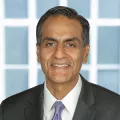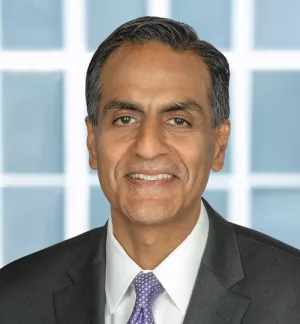Belfer Center Senior Fellow Richard Verma has officially become the highest-ranked Indian-American diplomat in United States history. On April 5, Verma was sworn in as Deputy Secretary of State for Management and Resources, the third-highest ranked official in the State Department.
Verma was first nominated for the position by President Joe Biden in December 2022 and confirmed by the U.S. Senate on March 30.
First created by Congress in 2000, the Deputy Secretary State for Management and Resources position remained vacant until 2009, when President Barack Obama appointed Jack Lew as the first title holder. Verma directly succeeds Brian P. McKeon, who held the position from March 2021 until December 2022.
It is clear Verma commands widespread respect across the political spectrum. During his Senate confirmation hearing back in February, Democratic and Republican Senators lauded his commitment and vision, stating that he was the “right person at the right time” to serve in this position. Senator Ben Cardin, who introduced Verma to the Senate Foreign Relations Committee (SFRC), said that he couldn’t “think of a more qualified nominee to take over the Deputy Secretary position for management and resources.”
Verma has played an integral role in shaping U.S. foreign policy at the highest levels for over three decades. He brings a wealth of experience inside and outside the government, which includes his time in the U.S. Air Force, as National Security Adviser to former Senate Majority Leader Harry Reid, and as Assistant Secretary of State under Hillary Clinton (and during the Obama administration). During his time in the Senate, Verma made serious headways by helping launch the monumental U.S.-India civilian nuclear deal.
From 2014 to 2017, Verma served as U.S. Ambassador to India and played a critical role in growing the U.S.-India strategic partnership. As the first-ever Indian-American envoy to New Delhi, he also became the first U.S. ambassador to India to visit every Indian state, which included a memorable trip to his ancestral village of Apra in Jalandhar, Punjab.
Following his ambassadorship, Verma spent the next few years in the private sector, serving as vice chair of The Asia Group and Chief Legal Officer and Head of Global Public Policy at Mastercard. Yet it didn’t take much time for Washington to call him back for his expertise, now via one of America’s topmost diplomatic positions.
During his confirmation hearing, Verma expertly fielded questions from the SFRC members and noted the quintessential strategic challenges that the State Department faces, including the War in Ukraine, U.S. competition with China, climate change, and cyberspace, and stressed that the Department was continuing its work to prioritize digital freedom. In his geopolitical outlook, he stated that the relationship between the U.S. and India would be the ‘defining partnership’ of the 21st century.
Verma additionally emphasized the need for the State Department to invest in its personnel adequately going forward and to have the tools, resources, and training to meet its challenges and achieve Secretary of State Antony Blinken’s modernization agenda. He expressed great optimism about America’s ability to lead on the global stage, but added that this would require the U.S. to be present around the world.
Verma’s nomination is truly momentous. Having someone as accomplished as he is in such a senior diplomatic position is a tremendous asset to the State Department and United States, and will hopefully inspire many other Americans to pursue careers in diplomacy and public service.
ABOUT THE AUTHOR
Abhinav Seetharaman is a Master in Public Policy (MPP ’23) student at Harvard Kennedy School with regional interests in South and Southeast Asia. He was most recently a research assistant at the Kennedy School's Belfer Center to Richard Verma, then Senior Fellow with the Belfer Center.
Seetharaman , Abhinav . “A Historic Moment: Richard Verma Sworn In as Deputy Secretary of State for Management and Resources.” Belfer Center for Science and International Affairs, Harvard Kennedy School, April 17, 2023


